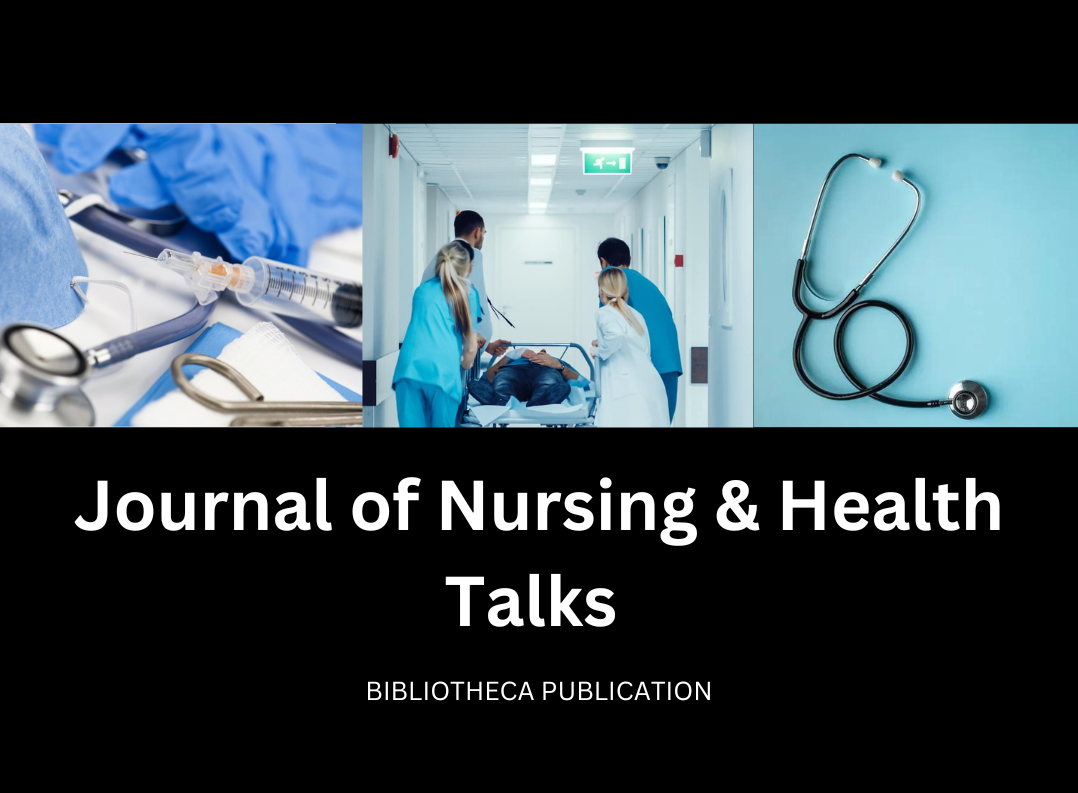Journal of Nursing & Health Talks: A peer-reviewed journal that aims to publish reliable information about nursing in articles like research papers. It covers all the topics related to Nursing and Health.
Journal of Nursing & Health Talks mainly focused on:
Patient Education: Patient education is a crucial aspect of nursing care, aimed at empowering patients to manage their medical needs independently after they leave a hospital, treatment center, or doctor’s office. Educating patients on how to continue their care is a key responsibility of nurses in promoting patient health. This education may cover various instructions, including:
- Managing treatment at home, such as properly dressing a wound.
- Administering medications, like insulin injections.
- Practicing preventive care, such as making dietary changes for long-term health.
- Providing and explaining printed materials like guides and checklists to help patients remember essential self-care information.
- Demonstrating the use of equipment, such as oxygen tanks, for home use.
Communication: Effective communication can greatly enhance the patient-provider relationship in various ways. It enables patients to become more informed about their own health, empowering them to adopt proactive health and wellness strategies. It also helps patients gain a thorough understanding of the current care plans related to their health, including during acute health situations. Furthermore, good communication fosters trust between the patient and provider, which can make it easier for patients to follow the provider’s recommendations. These factors can contribute to several important long-term benefits, such as fewer patient visits, lower healthcare costs, and improved patient outcomes. As technology becomes increasingly integrated into healthcare, effective communication becomes even more critical. It helps counteract the influence of health misinformation, which might otherwise lead patients to make poor or incorrect health decisions. Additionally, it enhances communication among healthcare professionals who need to coordinate care across multiple facilities, leading to better opportunities for delivering quality care.
Basic life support: Basic Life Support (BLS) is intended for healthcare professionals and trained first responders who deliver care in various in-facility and prehospital settings. It is also required for those seeking BLS certification and CPR training to enroll in a healthcare-related training program.
Hospital: A hospital is a healthcare institution equipped with an organized medical and professional staff, along with permanent facilities that include inpatient beds. It provides medical, nursing, and other health-related services to patients.
Nursing Scheduling: This refers to the systematic assignment of nursing shifts to ensure that patient needs are consistently met while also maintaining a fair distribution of work among the nursing staff.
Key Elements of Effective Nursing Scheduling:
- Fairness: Ensuring that all nursing staff receive an equitable distribution of work shifts, including weekends and night shifts.
- Flexibility: The schedule should accommodate changes in case of unexpected situations.
- Efficiency: The schedule should aim to maximize productivity while minimizing unnecessary downtime.
Clinic: A clinic is a healthcare center where you receive routine preventive care when you are healthy or visit your doctor or primary care provider when you are ill. Clinics are smaller than hospitals, serving patients with less severe conditions who do not require overnight stays. It’s advisable to schedule an appointment to see your doctor at the clinic.
Some reasons to visit a clinic or doctor’s office to see your primary care provider include:
- Routine medical check-ups
- Appointments when you’re feeling unwell
- Immunizations
Leadership: Leadership is the capacity of an individual or group to influence and guide followers or members within an organization, society, or team. While leadership is often associated with a person’s title, seniority, or rank in a hierarchy, it is an attribute that anyone can possess or develop, regardless of their formal position. Leadership is a skill that can be cultivated and enhanced over time. Leaders are essential in various areas of society, including business, politics, religion, and social or community organizations. They are recognized for making sound and sometimes difficult decisions, articulating a clear vision, setting achievable goals, and equipping their followers with the knowledge and tools needed to reach those goals. An effective leader typically exhibits characteristics such as self-confidence, strong communication and management abilities, creative and innovative thinking, perseverance, a willingness to take risks, openness to change, a calm demeanor, and the ability to respond effectively in times of crisis.
Registered Nurse: A Registered Nurse (RN) is a healthcare professional who provides direct care to individuals, families, groups, and communities, promoting health and wellness. RNs collaborate with physicians and other healthcare providers to coordinate patient care as part of a team.
What Do Registered Nurses Do?
- Coordinate nursing care to address physical, mental, emotional, and spiritual needs, aiming to promote, maintain, or restore health.
- Deliver direct nursing care, including treatments, administering medications, and performing procedures.
- Develop and implement health education programs.
- Teach nursing theory and practice.
Where Do Registered Nurses Work?
Registered Nurses are found in nearly every area of healthcare. Many have specialized skills and work in specific departments such as critical care, health promotion, or cancer care. While most RNs provide patient care, others are involved in clinical practice, administration, education, and research.
Settings include:
- Health Clinics
- Hospitals or Healthcare Centers
- Doctor’s Offices
- Home Care
- Long-Term Care Facilities
- Community Settings
- Schools
Vital Sign: Vital signs are measurements of the body’s fundamental functions. The four primary vital signs regularly monitored by medical professionals and healthcare providers include:
- Body temperature
- Pulse rate
- Respiration rate (breathing rate)
- Blood pressure (although not considered a vital sign, it is often measured alongside them)
Vital signs are valuable for detecting or monitoring medical issues. They can be measured in various settings, including medical facilities, at home, during a medical emergency, or elsewhere.
Wound Care:
Analytical Skill:
Collaboration:
Infection Control:
Teamwork:
Physical medicine and Rehabilitation:
